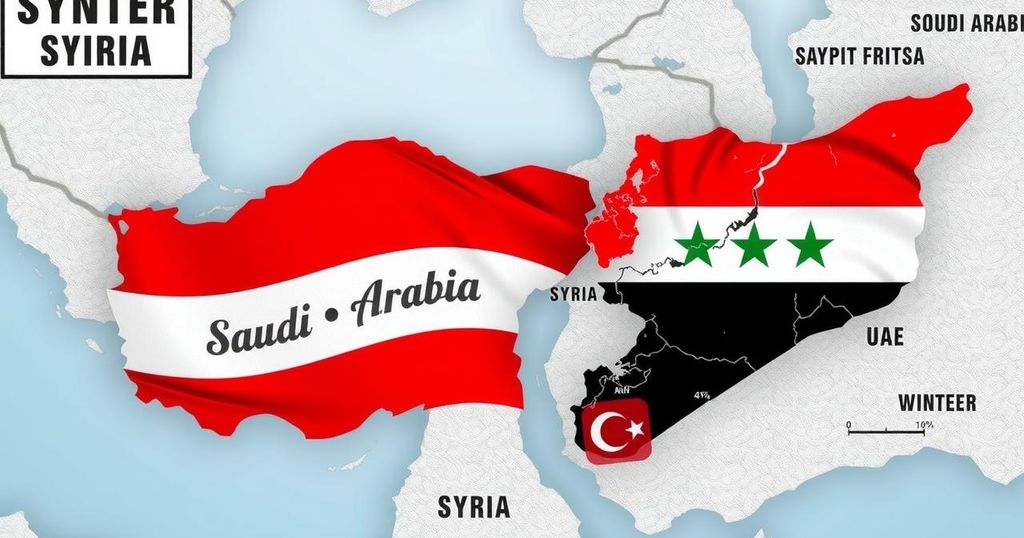Turkey Pursues Gulf Cooperation for Syria’s Future Stability

Turkey is seeking support from Saudi Arabia and the UAE in shaping a new governance model for Syria following the collapse of Assad’s regime. President Erdogan emphasizes the importance of a neutral, non-threatening Syria and aims to foster collaboration among regional powers to ensure stabilization and prevent the rise of Iranian or Turkish domination. Key discussions are anticipated at the upcoming Cairo summit, alongside ongoing negotiations with Russia regarding its military presence in Syria.
The abrupt downfall of Bashar al-Assad’s regime in Syria has placed Turkey in a pivotal role as a key influencer in the nation’s future. Despite this opportunity, Turkish leaders are exhibiting prudence, aiming to avoid the pitfalls witnessed during the Arab Spring. They acknowledge the necessity of securing backing from regional allies and Western nations to ensure stability in Syria, which is home to 20 million people.
President Recep Tayyip Erdogan is actively seeking the engagement of Gulf states like Saudi Arabia and the United Arab Emirates, who have been cautious regarding groups such as the Muslim Brotherhood, to foster their long-term support for Syria’s governance. “The president believes the concerns raised by Saudi Arabia and particularly the United Arab Emirates should be heard, and their advice valued in Syria,” stated a source acquainted with the government’s perspective.
Erdogan is set to participate in a summit in Cairo, alongside Egyptian President Abdel Fattah el-Sisi, where discussions regarding the new Syrian governance model are expected to take place. Sisi harbors strong opposition to Islamist entities and is particularly apprehensive about the ascendance of Hay’at Tahrir al-Sham (HTS) in the capital.
Beyond mere discussions, Ankara’s ambitions intertwine with complex geopolitical considerations. While Turkey has historically rejected direct support for HTS, it openly acknowledges its influence over the militant group. During a recent television interview, Turkish Foreign Minister Hakan Fidan asserted, “No one knows this group better than Turkey,” emphasizing Turkey’s role in stabilizing the region.
In light of upcoming conferences and negotiations, Turkey advocates for a unified, neutral Syria. “Our wish is the emergence of a Syria that does not pose a threat to other countries—especially in terms of terrorism,” Fidan articulated.
Furthermore, Turkey’s officials are keen on establishing a collaborative regional order, explicitly rejecting both Iranian and Turkish dominance within Syria. Fidan underscored the importance of mutual cooperation amongst regional players to prevent external influences from exacerbating conflicts: “We must commit to protecting one another. Otherwise, external hegemons will intervene, exploit regional polarization, and cause long-term conflicts.”
Turkey’s attempts to forge closer ties with the UAE have already yielded results, as Gulf leaders alter their previously pro-Assad positions. Abdulkhaleq Abdulla, a notable academic, asserted that the UAE intends to spearhead investments in Syria’s recovery. Meanwhile, Turkish officials recognize that substantial financial support from Gulf states and Western nations will be critical for reconstruction efforts.
As European Commission President Ursula von der Leyen recently announced a commitment to facilitating essential services within Syria, the involvement of the European Union appears increasingly likely. However, the ongoing presence of Russian military bases complicates this dynamic, with some EU countries stressing the need for Russian withdrawal prior to granting assistance. Negotiations between Moscow and HTS regarding its military presence underscore the challenges ahead, as Ankara seeks broader recognition and aid from both Russia and Iran.
Overall, Turkey’s approach emphasizes regional unity and stability while addressing the multifaceted geopolitical complexities inherent to Syria’s future.
The Syrian conflict has placed immense strain on the geopolitical landscape of the Middle East. Following the upheaval experienced during the Arab Spring, Turkey has emerged as a significant actor in the dialogue concerning Syria’s eventual governance structure. With neighboring nations and global powers evaluating their roles, Turkey’s strategy encompasses building alliances, particularly with Gulf countries, to ensure lasting stability and a non-threatening Syrian state to the surrounding region.
In conclusion, Turkey’s pivotal role in shaping Syria’s future is marked by a cautious yet strategic approach, leveraging alliances with Gulf nations to secure essential backing for reconstruction efforts. Maintaining a non-threatening and neutral government in Syria remains paramount to Ankara, as they navigate complex geopolitical dynamics involving major players like Russia and Iran. Ultimately, fostering regional cooperation is viewed as imperative to deter foreign influences and ensure long-term peace in the region.
Original Source: www.middleeasteye.net








